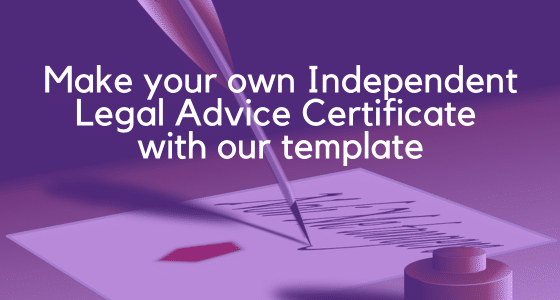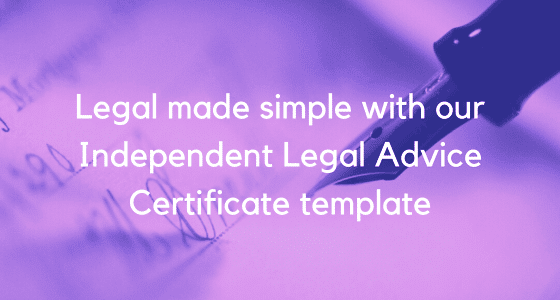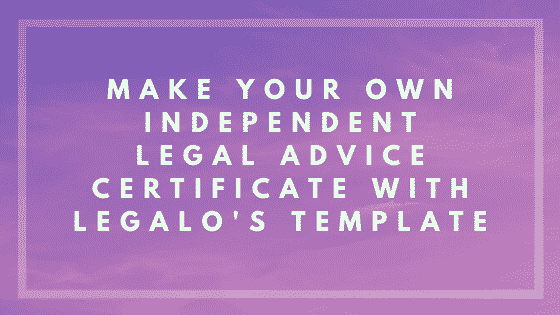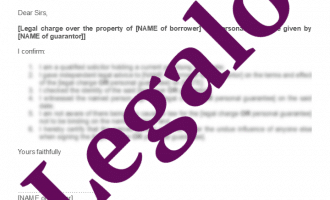Independent Legal Advice Certificate
Our Independent Legal Advice Certificate template:
- use for legal charges or guarantees
- expertly-drafted template for peace of mind
- protects your security
- ensures compliance with case law and best practice
- easy to edit and complete

How Does It Work?
-
1. Download
-
2. Edit
-
3. Print
-
4. Sign
This template for an Independent Legal Advice Certificate is intended for use either:
- where someone is giving a legal charge as security for a loan and the lender is under a duty to ensure that person receives the benefit of independent legal advice before signing the security documentation. See the heading below: The Etridge Case; or
- where a guarantor is being asked to sign a personal guarantee of someone else’s debt, loan, or other obligations and the lender wants them to have the benefit of independent legal advice before signing (this is best practice).
For item 1 above, such an event commonly occurs when the husband borrows money to fund his business and, in return, he grants a legal charge or mortgage over the family home in favour of the lender. In such a case, the borrower and lender would need the wife’s consent to the charge’s going in place. She would need to sign the charge or mortgage, so that she defers her rights to the lender’s (usually being a bank). Even if she is not on the title deeds to the house you will still need her consent, as she will have the right to occupy the house.
For item 2 above, if you need a template for a personal guarantee, then just click here or use our guaranteed loan agreement if it is for the guarantee of a new loan.

When to use our Independent Legal Advice Certificate template
Often the lender, if it is a mainstream bank, will have its preferred form of certificate. If so, it will supply the draft and it will ask the wife’s independent legal adviser to sign it. However, if the lender is a private lender, then that is precisely when you can use our form of certificate. Also use it where the lender does not supply the necessary draft or does not have one.
If you are a private lender, you would still want to know the independent advice has been properly given before a legal charge is signed. (Technically it is optional, but is best practice and increasingly common, for lenders also to require this in the case of guarantees.) So it is for the benefit of both:
(a) the wife, so she knows what she is doing and the risks involved, and
(b) you as the lender, so that you know the wife cannot turn round later and say you failed to ensure she got independent legal advice on her rights before she signed them away.
If you did fail to ensure she obtained such independent advice, then:
- you might find the security against her interest or rights in the property is void, and
- as a result, you might be unable to repossess the home or evict her.
The Etridge case
In banking law, the lender has a duty to the wife in accordance with an English legal case. The case was Royal Bank of Scotland plc v Etridge (No 2), from 2001. The outcome of that case is why this form of certificate can be useful. It is also why the independent legal advice is mandatory in similar circumstances. It protects both the wife’s interests and those of the lender in the case of legal charges. You can read more about this case and how it applies here: https://en.wikipedia.org/wiki/Royal_Bank_of_Scotland_plc_v_Etridge_(No_2).
Using our Independent Legal Advice Certificate template
You will find our template exceedingly easy to use. A UK solicitor who is knowledgeable about English banking law drafted it, so you know you can rely on it.
You should either:
- give it to the person needing the independent advice to take to her solicitor, or
- send it to the solicitor advising her.
The solicitor will know how to complete it. For this reason, it does not come with any separate guide as to its completion and use, as our other templates do. However, if you have any queries about it, just contact us.
Once the solicitor has completed and returned it and you have the signed legal charge or guarantee back from the person due to sign it, then you should keep the certificate safe with the original of the legal charge or guarantee in case of the need to prove the person signing it:
-
- was duly and independently advised, and
- indeed understood the nature of what they were signing.

FAQs on the Independent Legal Advice Certificate
Below, we address the top questions on this subject from the Internet.
What is an independent legal advice letter?
An independent legal advice letter is a document provided by a legal professional to confirm that a person has received independent legal counsel and fully understands the implications of a legal transaction or agreement. You commonly use it in situations where a person may be entering into a contract, settlement, or legal document that could have significant consequences. Sometimes you need the certificate where the law says that a lender has a duty of care towards someone giving security over their home for a loan. The document helps demonstrate that the individual has made an informed decision and reduces the risk of later claiming they were coerced or unaware of the legal implications. It also protects the lender in such situations from a claim that the person giving security was misled.
Can anyone give legal advice in the UK?
Only certain qualified people can give legal advice in the UK for the purpose of the independent advice certificate, as lenders will not accept just anyone. Only qualified and authorised individuals can provide this independent legal advice, such as solicitors, barristers, and legal executives who both:
- are regulated by professional bodies; and
- hold insurance in case they got the advice wrong.
Does independent legal advice need to be in person?
Independent legal advice (ILA) does not necessarily need to be in person in all cases. It can be provided remotely through methods such as video conferencing, phone calls, or even written communication in certain circumstances. However, the method of advice may vary depending on the complexity of the issue, the preferences of the parties involved, and any legal requirements. Where the adviser needs to countersign the security document, such as the mortgage deed, it can be easier to do this in a face-to-face meeting.
What is proof of independent legal advice?
Proof of independent legal advice typically consists of a signed and dated independent legal advice certificate or letter from a qualified legal professional. This document confirms that the individual seeking advice:
- received it;
- understands the implications of the legal transaction; and
- made an informed decision.
It usually also includes details of the advisor’s credentials.
Can you give legal advice without a licence in the UK?
No, you cannot provide independent legal advice without a suitable licence in the UK. Such legal advice should only be given by qualified and licensed legal professionals who are:
- authorised to practise law in a specific jurisdiction; and
- hold professional indemnity insurance.
Why do I need independent legal advice?
Independent legal advice is crucial to ensure that your legal rights and interests are protected when entering into agreements or making significant decisions. It helps you fully understand the legal implications, risks, and consequences of your actions, as well as ensuring fairness, avoiding conflicts of interest, and upholding the integrity of legal processes. It is often required when signing contracts, making wills, or settling disputes to ensure you make informed choices and comply with all relevant legal requirements.
Who needs independent legal advice?
Anyone facing legal decisions or transactions that may have legal implications, such as signing contracts, making wills, divorcing, or settling disputes, may need independent legal advice. It is especially important when dealing with complex or unfamiliar legal matters to ensure:
- your rights are protected; and
- you understand the implications fully.
So the advantage of getting legal advice is that it:
- provides clarity;
- helps avoid conflicts of interest; and
- ensures informed and fair decision-making.
Does independent legal advice need to be face-to-face?
No, independent legal advice doesn’t necessarily need to be face-to-face. You can often obtain it through remote consultations, such as video conferencing, depending on the specific legal requirements and the preferences of the parties involved. Regardless of the mode of delivery, the key is to:
- ID check the person receiving the advice;
- ensure effective communication; and
- evidence their understanding the legal advice.
Can you write your own legal advice certificate?
Yes, you can write your own legal certificate with our handy and easy-to-use template. Legal documents should be clear, concise, and follow legal norms. You can ensure this is all taken care of when using a Legalo template. However, you will still need to take the draft to a lawyer, so that they can:
- provide the necessary independent legal advice; and
- sign off on the certificate.
What is proof of legal advice?
Proof of independent legal advice typically involves a signed letter or certificate from a qualified lawyer. This document should outline the advice given, the date, and the party advised. It serves as evidence that you sought and received legal guidance in a particular matter. This can be crucial in legal disputes, contract enforcement, or other legal situations.
What is an ILA when buying a house?
Independent legal advice when buying a house involves consulting a separate lawyer from the one representing the buyer and lender. This is optional, as normally the same solicitor acts for buyer and lender to save on legal fees. This impartial lawyer reviews the purchase agreement, property title, and related documents to ensure your interests are protected. The advice will include offering guidance on legal matters, potential risks, and obligations. It ensures you make informed decisions and safeguards your rights during the property transaction.
How much can independent legal advice cost?
The cost of independent legal advice can vary significantly depending on factors such as:
- the complexity of the legal matter;
- the location (expect to pay a lot more in London); and
- the lawyer’s seniority or experience.
It is normally a couple of hundred pounds in the UK for simpler matters, such as loan security. Some lawyers will offer fixed fees for specific services, and others charge based on hourly rates. For those with limited financial means, unfortunately legal aid (sadly, rarely these days) is unlikely to be available for this type of advice, but pro bono services may be available in certain cases.



